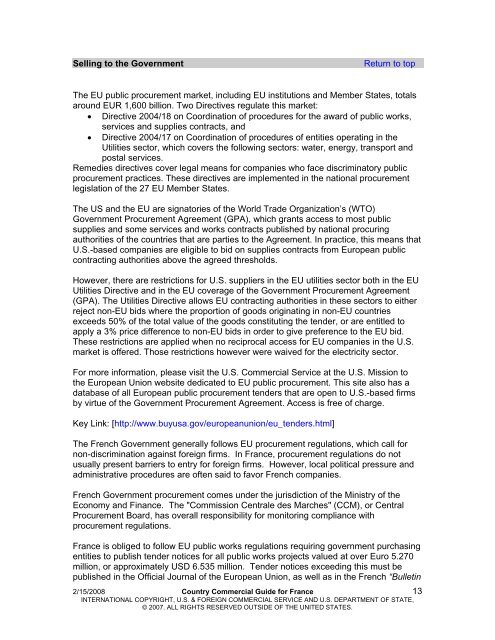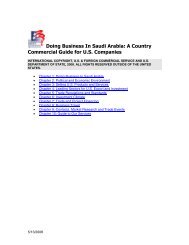Doing Business In (Insert Country Name Here) - BNA
Doing Business In (Insert Country Name Here) - BNA
Doing Business In (Insert Country Name Here) - BNA
You also want an ePaper? Increase the reach of your titles
YUMPU automatically turns print PDFs into web optimized ePapers that Google loves.
Selling to the Government Return to top<br />
The EU public procurement market, including EU institutions and Member States, totals<br />
around EUR 1,600 billion. Two Directives regulate this market:<br />
• Directive 2004/18 on Coordination of procedures for the award of public works,<br />
services and supplies contracts, and<br />
• Directive 2004/17 on Coordination of procedures of entities operating in the<br />
Utilities sector, which covers the following sectors: water, energy, transport and<br />
postal services.<br />
Remedies directives cover legal means for companies who face discriminatory public<br />
procurement practices. These directives are implemented in the national procurement<br />
legislation of the 27 EU Member States.<br />
The US and the EU are signatories of the World Trade Organization’s (WTO)<br />
Government Procurement Agreement (GPA), which grants access to most public<br />
supplies and some services and works contracts published by national procuring<br />
authorities of the countries that are parties to the Agreement. <strong>In</strong> practice, this means that<br />
U.S.-based companies are eligible to bid on supplies contracts from European public<br />
contracting authorities above the agreed thresholds.<br />
However, there are restrictions for U.S. suppliers in the EU utilities sector both in the EU<br />
Utilities Directive and in the EU coverage of the Government Procurement Agreement<br />
(GPA). The Utilities Directive allows EU contracting authorities in these sectors to either<br />
reject non-EU bids where the proportion of goods originating in non-EU countries<br />
exceeds 50% of the total value of the goods constituting the tender, or are entitled to<br />
apply a 3% price difference to non-EU bids in order to give preference to the EU bid.<br />
These restrictions are applied when no reciprocal access for EU companies in the U.S.<br />
market is offered. Those restrictions however were waived for the electricity sector.<br />
For more information, please visit the U.S. Commercial Service at the U.S. Mission to<br />
the European Union website dedicated to EU public procurement. This site also has a<br />
database of all European public procurement tenders that are open to U.S.-based firms<br />
by virtue of the Government Procurement Agreement. Access is free of charge.<br />
Key Link: [http://www.buyusa.gov/europeanunion/eu_tenders.html]<br />
The French Government generally follows EU procurement regulations, which call for<br />
non-discrimination against foreign firms. <strong>In</strong> France, procurement regulations do not<br />
usually present barriers to entry for foreign firms. However, local political pressure and<br />
administrative procedures are often said to favor French companies.<br />
French Government procurement comes under the jurisdiction of the Ministry of the<br />
Economy and Finance. The "Commission Centrale des Marches" (CCM), or Central<br />
Procurement Board, has overall responsibility for monitoring compliance with<br />
procurement regulations.<br />
France is obliged to follow EU public works regulations requiring government purchasing<br />
entities to publish tender notices for all public works projects valued at over Euro 5.270<br />
million, or approximately USD 6.535 million. Tender notices exceeding this must be<br />
published in the Official Journal of the European Union, as well as in the French “Bulletin<br />
2/15/2008 <strong>Country</strong> Commercial Guide for France 13<br />
INTERNATIONAL COPYRIGHT, U.S. & FOREIGN COMMERCIAL SERVICE AND U.S. DEPARTMENT OF STATE,<br />
© 2007. ALL RIGHTS RESERVED OUTSIDE OF THE UNITED STATES.












